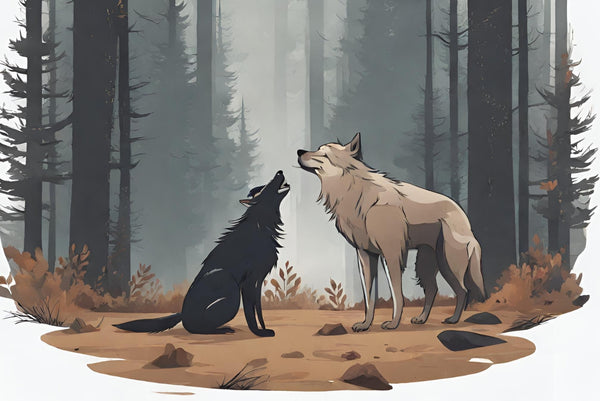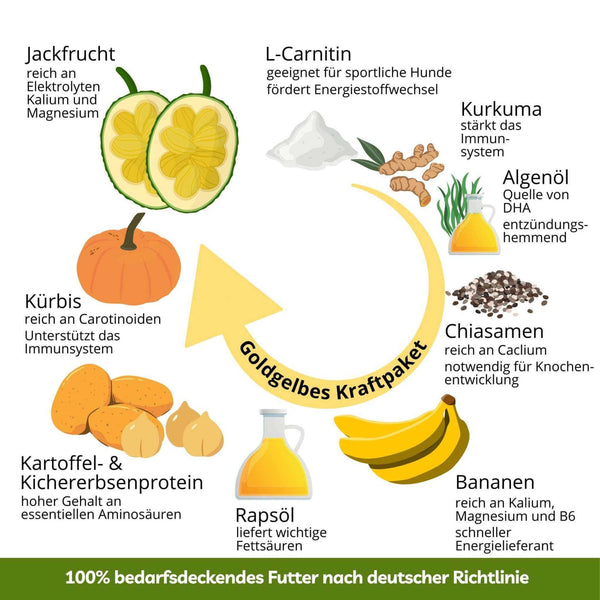At a time when human nutrition changes are strongly influenced by environmental awareness and ethical considerations, many dog owners are considering the possibility of feeding their four-legged friends a vegetarian or even vegan diet. This comprehensive guide provides detailed insights into all aspects of vegetarian and vegan dog nutrition, from evolutionary adaptations to modern nutritional insights.
Evolutionary adaptations and natural feeding behavior
From wolf to domesticated dog
Domestication has significantly changed the eating behavior of dogs over the millennia. Dogs originally descended from wolves, which are classified as carni-omnivores. This means that wolves primarily eat meat, but also consume plant components in the form of the stomach contents of their prey. However, dogs have adapted to the starchy foods that humans consume. This is evident in their ability to digest starch efficiently, thanks to the evolution of more amylase-producing genes compared to their wild ancestors.
Jürgen Zentek, professor at the Free University of Berlin and a veterinarian specializing in animal nutrition and dietetics, has dealt intensively with the topic of dog nutrition. His many years of commitment are reflected, among other things, in his lectures "From Wolf to Dog - Consequences of Domestication for Nutrition": To the lecture

Digestibility of starches and plant materials
Modern dogs have a digestive system that can effectively break down starchy foods. This ability is a direct result of domestication and sharing food with humans. Studies show that over time, dogs have developed enzymes that help them utilize carbohydrates from plant sources.
Nutritional needs and vegetarian diet plans
Key Nutrients for Dogs
A fully nutritious dog diet plan must include the following components:
- Proteins : Proteins are essential for building and repairing tissues. Plant proteins from sources such as lentils, fava beans and chickpeas can complement or replace animal proteins provided they are properly combined to provide a complete amino acid profile. Depending on the processing method, different amounts should be used. For example, if you use cooked chickpeas, you can use up to 20%. However, if you use protein concentrates, then more like 10%.
- Fats : Fats are important for energy, cell function and the absorption of fat-soluble vitamins. Vegetarian sources such as linseed oil and coconut oil provide essential fatty acids. It's important to use good fatty acids that provide energy, such as coconut oil, hemp oil and flaxseed oil. But also omega-3 suppliers that provide EPA & DHA, such as algae oil, fish oil or salmon oil. DHA (docosahexaenoic acid) and EPA (eicosapentaenoic acid) are omega-3 fatty acids that are essential for human and animal health. They are particularly important for brain function, nerve cell development, vision and the regulation of inflammation in the body. These fatty acids are found in various foods such as fish, algae, linseed oil and walnuts. Adequate intake of DHA and EPA may help support cognitive function, reduce inflammation, and reduce the risk of cardiovascular disease.
- Carbohydrates : Carbohydrates are your dog's primary source of energy and should make up a significant portion of his diet. Good sources of carbohydrates in a vegan dog diet are gluten-free options such as sweet potatoes, potatoes or tapioca. Pseudograins such as amaranth or quinoa are also rich in carbohydrates and offer a good variety. Be sure to cook the carbohydrates appropriately to aid your dog's digestion and provide him with a long-lasting source of energy.
- Vegetables & Fruit: Vegetables and fruits are not only a source of important nutrients, but also fiber, which promotes digestion and supports intestinal health. Good sources of vegetables for your dog include pumpkin, carrots, beets, spinach and broccoli. These not only provide vitamins and minerals, but also a variety of antioxidant compounds that can protect cells from damage. Fruits like bananas, apples, and berries can be used as healthy snacks and provide your dog with additional vitamins, minerals, and fiber.
- Vitamins and minerals : Some vitamins and minerals may not be present in sufficient amounts in a purely plant-based diet for dogs and therefore need to be supplemented. Examples of this are vitamin B12 and vitamin D. These can be ensured by using nutritional supplements such as special vitamin and mineral preparations for your dog's diet. It is important to follow the recommended dosage and check whether the food is declared as a complete feed to ensure that your dog receives all the necessary nutrients.

Designing a vegetarian diet plan
Creating a balanced vegetarian diet plan requires careful consideration:
- Diversify protein sources : Include different plant-based proteins to ensure a full spectrum of amino acids.
- Balanced omega fatty acids : Supplement the diet, for example with algae oil or hemp oil, to ensure a good ratio of omega-3 to omega-6 and to cover EPA & DHA requirements.
- Regular checks : Blood tests help monitor your dog's nutritional status and make adjustments.
Scientific perspectives and studies
Current research results
Studies on vegetarian dog nutrition show that dogs fed a balanced plant-based diet can be just as healthy as their carnivorous counterparts. However, these studies emphasize the importance of proper nutrient intake.
Critical nutrients and their sources
- Vitamin B12 and D : These vitamins need to be supplemented as they are not available in plant sources.
- Iron, zinc and taurine : Plant sources of these nutrients are often less bioavailable. Supplements may be necessary to avoid deficiencies.
Practical implementation: Vegetarian days
Different approaches such as the already established "Veggie Wednesday" are a simple and effective method to test your dog's reaction to vegetarian food. This provides an opportunity to gradually adjust the diet while reaping the benefits of reducing meat consumption, both for the dog's health and for the environment.
Environmental considerations
Switching to a plant-based diet can also help reduce your dog's environmental footprint. Plant-based food production typically requires fewer resources such as water and land compared to meat production.
Hence BugBell
BugBell is the right choice for plant-based alternatives when it comes to high-quality, transparent and nutritional nutrition for your pets. At BugBell we believe in absolute transparency and openly declare the ingredients in our products. Our products contain high-quality plant-based proteins such as chickpeas, broad beans and hemp, which are an excellent source of protein for dogs. Additionally, we use algae oil, a rich source of omega-3 fatty acids, which are important for skin, coat and brain health. All our recipes are fully compliant with the European FEDIAF (European Pet Food Industry Federation) guidelines to ensure your pets receive all the nutrients they need. Discover our selection of vegan products now on our website: BugBell - All vegan products .





